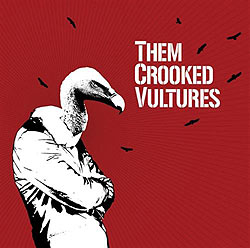Them Crooked Vultures, S/T
Published on January 30th, 2010 in: Current Faves, Music, Music Reviews, Reviews |By Adam McIntyre
Come over to my recording studio and let’s listen to something very loud.
Here’s why I have a major hard-on for Them Crooked Vultures: it’s tailored for me. I mean, I am its target audience. I have intense respect for each of the four musicians involved, certainly bordering on talent-based mancrushes. I mean. . .

Adam cocks his head to the side and listens to the opening track, “No One Loves Me and Neither Do I” as it suddenly morphs from straight-up rocker to something far heavier and more sexually aggressive.
Yeah, like that. That’s what I’m talking about—they just did a 180 the very second I started getting too comfortable with the song. Okay, so you want to know what this is?
John Paul Jones was the bass player, keyboardist, and much more in Led Zeppelin. His real voice in the band as an arranger and writer could be felt whenever Zeppelin deviated from conventional rock and roll and into odd time signatures, strange scales evocative of other continents and ancient cultures—anything weird. He’s also a sharp, cerebral musician who has obviously, for every day before and since John Bonham died, actually sat down and practiced or composed on some instrument.
When I say he’s sharp, I mean he’s sharper than most 25-year-old prodigies and far more tasteful, but with that twinkle in his eye; that weirdness is always in there, waiting to come out and manifest itself in some unexpected way. In Them Crooked Vultures, he “explores the studio space” on several instruments. He’s. . . wow, check out this riff. . .
We listen to “Elephants,” which starts off with a fast, complicated, and yet beefy rock riff that stops and starts, reinvents itself as a blues riff, and then backpedals into the original juggernaut riff before going halftime as a deep, heavy, plodding bit of thunder.
That’s exactly what I mean; that fast stuff sounds like the sort of thing John Paul Jones comes up with on his solo albums. He nerds out later on with the trippy “Interlude with Ludes,” which sounds like the most straight-up Zeppelinesque thing on the album to me, mixed with a big dose of Queens of the Stone Age. Before I move on, I’d like to point out that I read this album is “littered with Zeppelin riffs and Jimmy Page-esque guitar solos,” and perhaps the review I saw just didn’t have much of a musical vocabulary to draw from because I don’t hear a bit of Jimmy Page’s style on this album.
In fact, guitarist and vocalist Josh Homme seems to have specifically avoided anything of the sort for fear of some halfwit making that very observation. It’s annoying and sort of troubling that Rolling Stone would say something like that. You won’t find anything remotely like Robert Plant (past or present) on this album, either.
That brings us to Josh Homme, of Queens of the Stone Age, and the frontman of TCV. Homme (rhymes with “Tommy”) is generally regarded as a well-connected, principled “good dude” in the musician community, a gifted multi-instrumentalist (he plays the hell out of some drums in his other band, Eagles of Death Metal, in addition to supplying most of the guitars in QOTSA), and an interesting vocalist.
QOTSA’s recent studio albums are almost entirely Homme’s creations, mixing guttural, stoned guitar riffs with dizzyingly cerebral arrangements and constant sexual tension. It’s Josh Homme’s mind that makes him so damn special. In QOTSA, he handles almost all of the vocal duties, sometimes deferring to cusping rock god Mark Lanegan for the deepest, sultriest songs, but mostly, he’s used to being the frontman and idea man these days. As a guitarist, he is a satisfying (if cerebral) riffer, and his solos usually build unusual melodies with lots of unexpected twists and bursts of atonal noise. He’s certainly not a conventional blues guitarist rock god. He likes to trick you with something you haven’t heard.
Pages: 1 2
Time limit is exhausted. Please reload the CAPTCHA.